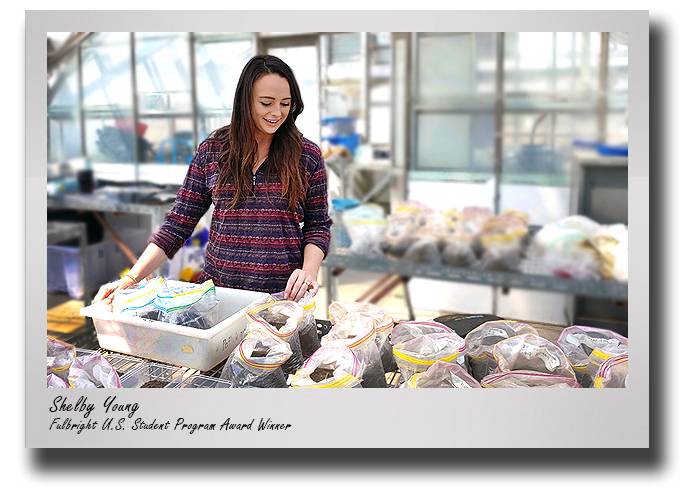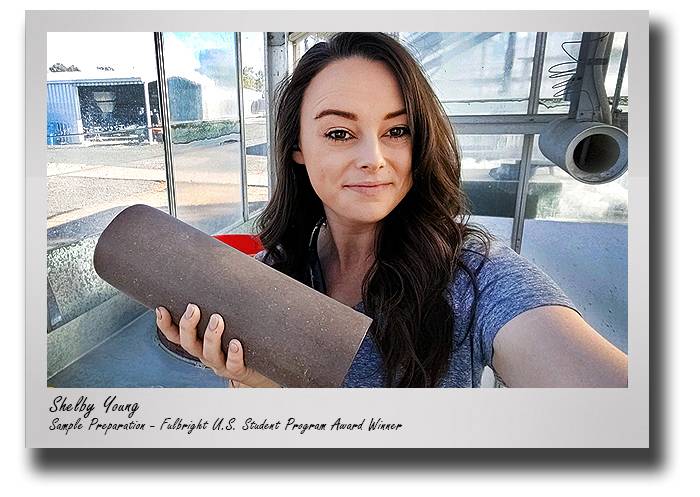PSS’s Young looks back on Fulbright U.S. Student Program in Australia
By: Amanda Bowman
 Recently Amanda Bowman, a Texas Tech media relations specialist, interviewed CASNR
grad Shelby Young, a standout student from the Department of Plant & Soil Science,
to review her Fulbright experience during the COVID-19 era. Young received her bachelor's
degree (2016), master's degree (2019) and master’s of agriculture business (2020)
from CASNR.
Recently Amanda Bowman, a Texas Tech media relations specialist, interviewed CASNR
grad Shelby Young, a standout student from the Department of Plant & Soil Science,
to review her Fulbright experience during the COVID-19 era. Young received her bachelor's
degree (2016), master's degree (2019) and master’s of agriculture business (2020)
from CASNR.
When Shelby Young found out she had received a prestigious Fulbright U.S. Student Program Award to research cotton disease in Australia, she was close to earning a master's degree in plant and soil science through Texas Tech's College of Agricultural Sciences & Natural Resources. During her time at the university, Young had traveled twice to Australia to learn more about the country's cotton industry and collaborate on work for her master’s thesis.
 Inspired by her travels, the Plainview, Texas native applied for a Fulbright award
to continue her research in Verticillium wilt, a soilborne fungal disease that contributes
to cotton yield loss in Australia and the United States. The pathogen colonizes the
plant's vascular system, negatively impacting water and nutrient uptake, causing wilting,
leaf discoloration and death.
Inspired by her travels, the Plainview, Texas native applied for a Fulbright award
to continue her research in Verticillium wilt, a soilborne fungal disease that contributes
to cotton yield loss in Australia and the United States. The pathogen colonizes the
plant's vascular system, negatively impacting water and nutrient uptake, causing wilting,
leaf discoloration and death.
Young began her program in rural Australia, referred to locally as regional Australia. “It was a pretty diverse and fast-paced experience,” Young said. “While I was out in regional Australia, I worked with nine cotton growers to sample quite a lot of fields for the Verticilllium wilt pathogen. I also built on some work I did for my master's degree that was a collaboration with Dr. Karen Kirkby's plant pathology lab at the Australian Cotton Research Institute.”
After her time in regional Australia, Young continued her work with Krikby at the New South Wales Department of Primary Industry, in conjunction with Jonathan Plett, a senior lecturer in plant microbe interactions at Western Sydney University. “I got the opportunity to build on research I'd already done, but also take it in a completely new direction,” Young said. “My university contact at Western Sydney University specialized in metabolomics profiling – the comprehensive quantitative and qualitative analysis of all small molecules in a system – which I had never done or looked into.
“We were able to get together and design a really cool experiment that hadn't been done before, and I learned a lot about the methodology behind that,” she said. “We aimed to look at the metabolomic profiles of cotton and the fungus that causes Verticillium wilt at several points throughout the disease process.”
Metabolites are small molecules that serve a wide variety of purposes in biological processes, she said. Plant pathogens produce metabolites that act as toxins as they attack the plant. Plants can produce metabolites in response to, and as a defense against, disease. Basically, the researchers could detect what metabolites were being produced by both the cotton plant and the Verticillium wilt pathogen during infection and as the disease progressed.
 And then, COVID-19 happened. Since Young was working for a state government organization,
she had to follow to their mandates. “Australia had a very strict lockdown policy,”
Young said. “Since I was working for the New South Wales Department of Primary Industry,
I was subject to the rules the state had in place to keep its employees safe."
And then, COVID-19 happened. Since Young was working for a state government organization,
she had to follow to their mandates. “Australia had a very strict lockdown policy,”
Young said. “Since I was working for the New South Wales Department of Primary Industry,
I was subject to the rules the state had in place to keep its employees safe."
 “So, one day, I was in the lab taking samples, and then I just never got to go back,"
she said. “ Dr. Jonathan Plett, a researcher I was working with at Western Sydney
University, kindly travelled out to the lab’ and loaded up all my plants in his car
to take them to his lab at the university.”
“So, one day, I was in the lab taking samples, and then I just never got to go back,"
she said. “ Dr. Jonathan Plett, a researcher I was working with at Western Sydney
University, kindly travelled out to the lab’ and loaded up all my plants in his car
to take them to his lab at the university.”
Graduate students in Plett’s lab processed the samples from Young’s plants and stored them in the freezer, where they sit ready to be analyzed today. “They can sit and wait there indefinitely, which is great,” Young said. “We rallied and got as much done as we could, so it was still productive.”
“We got a publication done while I was there that was from work we'd done previously together for my master's,” Young said. “Even though it got cut short there at the very end, it was an incredibly rewarding experience.”
In addition, she said, “We developed that into a tool that Australian farmers could use to predict the severity and likelihood of their crop developing diseases before they planted, so maybe they wouldn't plant cotton that year or make different management decisions.”
CONTACT: Glen Ritchie, Chair, Department of Plant and Soil Science, College of Agricultural Sciences and Natural Resources, Texas Tech University at (806) 834-4325 or glen.ritchie@ttu.edu
0812NM21
Davis College NewsCenter
-
Address
P.O. Box 42123, Lubbock, Texas 79409-2123, Dean's Office Location:Goddard Building, Room 108 -
Phone
(806)742-2808 -
Email
kris.allen@ttu.edu
